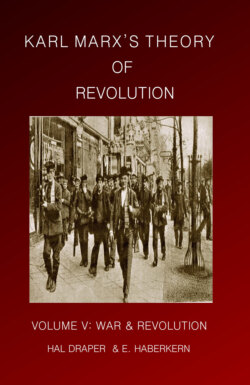Читать книгу Karl Marx’s Theory of Revolution Vol V - Hal Draper - Страница 7
На сайте Литреса книга снята с продажи.
1. The “Revolution” of August 14, 1914
ОглавлениеOn August 4, 1914, the Reichstag delegation of the German Social-Democratic Party joined the bourgeois parties and supported the government request for emergency war credits. It wrote a political as well as a financial blank check made out to German militarism. This political earthquake destroyed the Second International and the after shocks are still being felt.
Like most earthquakes this one was unexpected, although it had been preceded by the usual tremors. Everyone had expected the socialists to follow the example of Liebknecht and Bebel in 1870 and at least abstain on the vote. The socialists expected that themselves. Almost up to the day of the vote the Party press had continued to expose the provocative, bellicose, maneuvers of the Austrian and Prussian diplomats. And it was the German Party that had dominated the prewar conferences of the International where the movement had almost unanimously denounced the war preparations of the governments and the slavish support the bourgeois parties gave those governments as they rushed towards Armageddon.
The causes and consequences of this unexpected betrayal have been the topic of thousands of books, articles and doctoral theses. I am concerned with a narrower question. In order to cover themselves politically, the pro-war socialists looked for precedents in Marx and Engels. And they found more than enough for their purposes. They found evidence “proving” Marx and Engels to be rabid Russophobes who welcomed a war against Tsarist Russia by practically anybody.
Everyone, of course, was aware that hostility to Tsarism had been a prominent part of Marx and Engels’ politics. But no one had previously claimed that this hostility led to a support for the war policy of Tsarism’s great power rivals. Yet, after the swing of the German party majority into the prowar camp, even socialist opponents of the war, people like Lenin and Rosa Luxemburg, accepted this rewrite of history. These antiwar socialists could only argue that the policy Marx and Engels had pursued was outdated. What else could they have done under the circumstances? As we shall see, Marx and Engels wrote no systematic study of “the war question.” Their views were expressed in specific discussions of specific crises whose historical circumstances were, by 1914, often obscure if not completely forgotten. And Marx and Engels’ views evolved over decades as the state structure of Europe altered in response to war, national revolutions and the economic triumph of capitalism. The pressure to avoid a detailed historical account—and the lengthy research involved in constructing such an account—was overwhelming. Both Luxemburg and Lenin, not to mention lesser figures, simply decided to accept the main charge against Marx and Engels and move on. In doing so for obvious and compelling reasons they, nevertheless, put their imprimatur on the fabricated history of the prowar socialists.
Luxemburg, in the deservedly famous antiwar Junius Pamphlet, contrasted the Tsarist Russia of 1848 with the revolutionary post–1906 Russia, thus implying that Engels had died without changing his views on the Russian threat.1 But, as we will see, Engels had long abandoned the 1848 position and done so publicly in pamphlets and articles once well known not only to German socialists but to the international movement.
But it was Lenin’s antiwar polemics that were most responsible for leading practically all future historians astray.
